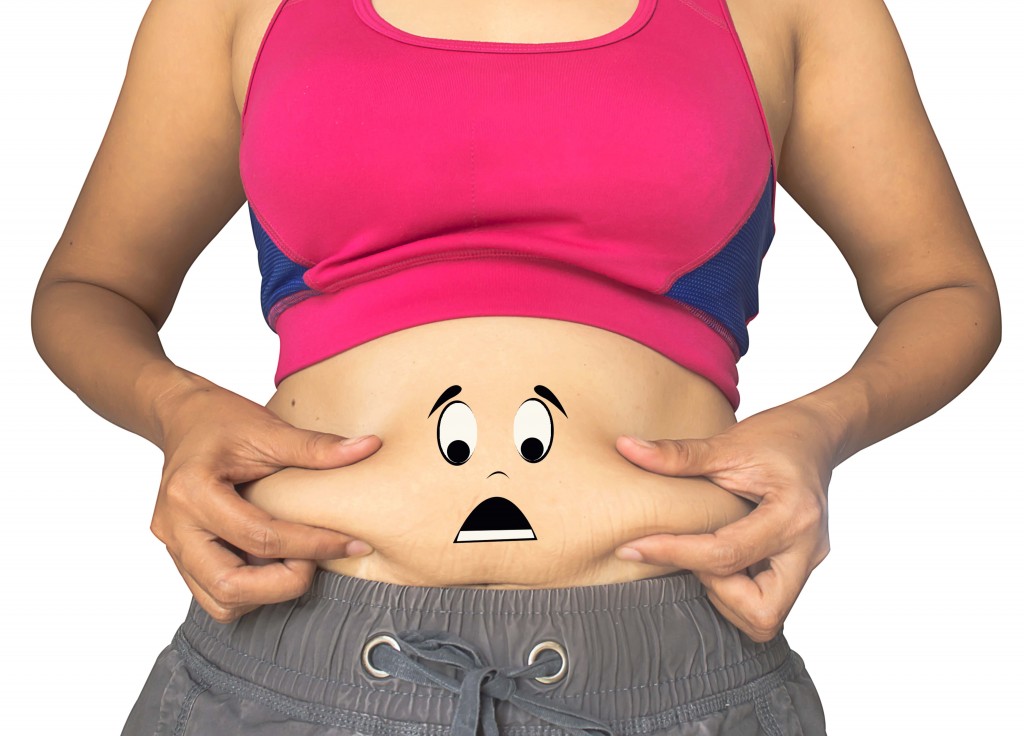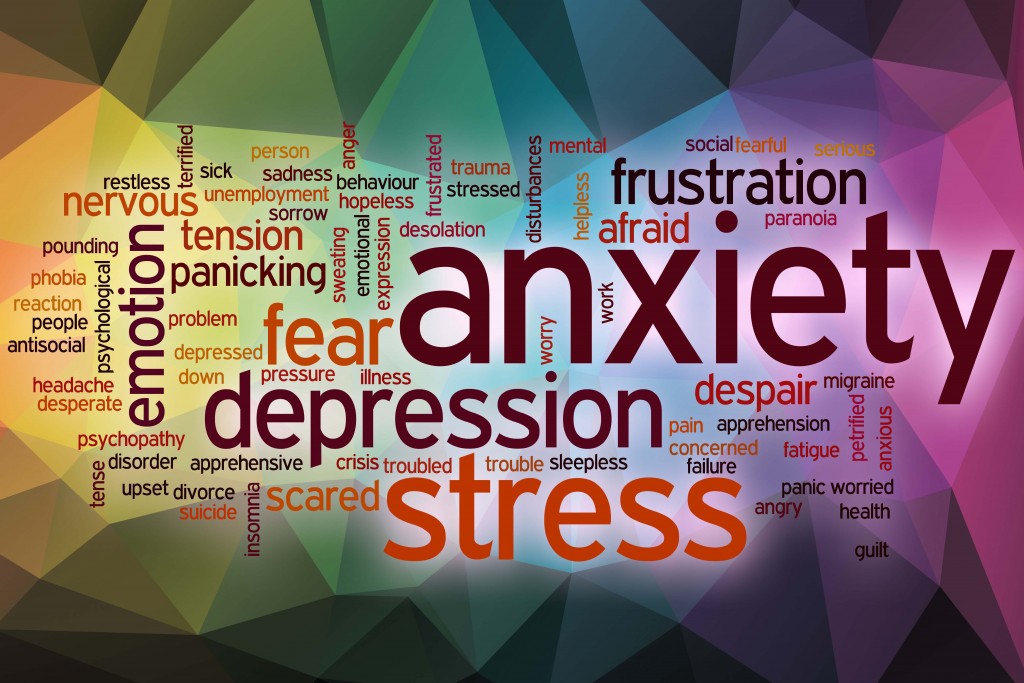“How to Deal with Stress,
Especially Depression or Anxiety That May Be
Causing You to Put On Excess Fat”
Part 2 of 4 Reasons Why You’re Possibly Not Losing Weight
& How To Address Each Problem NOW!
If you would like to finally understand the reasons why stress – especially anxiety and depression – can cause weight gain, and the link between stress and belly fat, then you have come to the right place.
A nine-year research trial has shown that both men and women suffering from stress related to job demands, anxiety and or depression gained significantly more weight (especially around the abdominal zone) than men and women who weren’t suffering from these conditions.1
Clearly the way we feel on a day to day basis needs to be a serious consideration when it comes to fat loss.
So, how does stress cause weight gain in the first place?
There are several physiological changes that take place in the body when we feel stressed, anxious and or depressed.
Changes involving a hormone called cortisol, are particularly important to take note of when it comes to stress and belly fat.
The role of cortisol in the body is to support our energy levels and to help us get through our daily activities. It is usually at its highest level when we wake up, and starts to drop off before we go to sleep.2
Unfortunately, when we experience prolonged stress cortisol levels can remain low or high all the time, and this can create several problems such as:
- Elevated blood glucose levels
- Insulin resistance
- Sugar cravings
- Abdominal fat storage2
Fight or Flight – the Ancient Coping Mechanism
The stress response is an evolutionary strategy to cope with immediate dangers, such as an approaching lion!
In response to an external threat, the chemical messengers, adrenaline, cortisol and noradrenaline are released from your adrenal glands, which enables you to either stand and fight or flee as fast as you can.
In modern times, the feeling of being under constant stress, whether from work, family or financial pressures is interpreted by your body in the same way as an approaching lion and can therefore lead you to be in a permanent state of emergency.
This is significant as stress may be the underlying reason for a seemingly unrelated bodily imbalance, such as an inability to digest well when you are under pressure and therefore increase abdominal or belly fat.

What is Stress Doing to Your Body?
A chronic state of stress can have widespread negative effects, such as:
- Poor digestion – reduced digestive secretions can lead to bloating, abdominal pain and reflux.
- Irregular blood sugar control – cortisol signals the release of sugars into the bloodstream in anticipation that muscles will need fuel to help you run away. These sugar spikes can lead to weight gain if the sugars are not utilised as muscle fuel and instead converted to fat. Therefore producing increased abdominal fat and fat around the buttocks.
- Hormonal imbalances – lack of libido, menstrual irregularity and fertility issues can all arise when your body switches to making stress hormones in preference to sex hormones.
Generally, we can tell when we are feeling stressed, but what about low-grade stress that you don’t know is happening to you?
Wayne has always said, “Never allow how you feel get in the road of how your body is functioning and the only way you can tell is by certain tests. Some people feel fantastic but when their stress test comes back their results tell a different story of an unhealthy stress response. The ONLY way you can tell how your body is functioning is by performing specific tests. The main test for stress is cortisol and urine testing is the best way to test. It’s also important to test cortisol 4 times during the day.”
Cortisol can then affect hormones like . . .
- DHEA
- Pregnenolone
- Melatonin
- Progesterone
- Estrogen (Did you know there are 3 types of Estrogen)
- Testosterone
For a detailed look at stress and how it may affect you please watch this video . . . it goes for approximately 28 minutes
Low grade stress can also cause anxiety or depression and they also may be affecting your weight.
Anxiety and depression symptoms to be aware of include:
- Feeling persistently ‘sad’ or ‘empty’
- Irritability
- Mood swings
- Loss of appetite or an increase in appetite
- Feeling hopeless or worthless
- Decreased energy
- Insomnia
- Feeling nervous or panicked
- Heart palpitations
- Nausea
- Sweaty palms or feet3
Now that we understand how stress, anxiety and depression can lead to weight gain, lets delve into how to deal with each condition naturally, so that you can work towards losing that excess fat.
Breaking the Cycle
It doesn’t have to be this way.
There are several nutrients and herbs that can help calm an overactive stress response, which may be hindering you from achieving your health goals.
For example, whether stress, anxiety or depression – magnesium is essential for the nervous system by supporting the appropriate functioning of your brains chemical messengers, the ‘neurotransmitters’.
Magnesium also produces energy, helping you resolve the fatigue that may come with being stressed. The best form of Magnesium is Magnesium amino acid chelate in the form of Meta Mag® – Magnesium bisglycinate.
In addition, the B vitamins (often taken as a complex and they are better being in an active form – Activated B Vitamins) work as a team with magnesium to support your nervous system as well as play a role in energy production themselves.
A class of herbs known as ‘adaptogens’ may be helpful to increase your body’s physical and mental capacity to cope with stress.
Traditional adaptogenic herbs include
- Withania
- Rehmannia
- and Rhodiola
If stress makes you uptight you may also need anxiolytic herbs or herbs best used to combat anxiety.
These herbs help reduce feelings of anxiety and promote more restful sleep so you can handle the challenges your day has for you more easily . . .
- Passionflower
- Zizyphus
- and Magnolia
Dealing with anxiety and stress can be confronting, but by implementing these simple steps into your daily life, you will be well on your way to overcoming this condition.
- Practice deep breathing daily – research has found that spending just a few minutes each day breathing slowly and deeply can have a profound effect on improving anxiety symptoms.3
- Move your body daily – gentle movement such as yoga, walking, Pilates, swimming or even just some simple stretches increases neurotransmitters that are known to have a calming effect on the body.4
- Remove artificial stimulants from your diet – things like coffee, chocolate, energy drinks and refined sugar products are well known to contribute to anxiety and stress. Replace these items with whole foods that are known to support your adrenal glands and your energy levels naturally, such as lots of fresh fruits and vegetables and herbal teas (licorice tea is great for a natural energy boost!).5
Dealing with depression can be equally as confronting and often it is best to work with a qualified healthcare practitioner to help guide you back to health and happiness.
The steps above may also help you to cope with depression; in addition to these you can also try the following:
- Start to use affirmations – Affirmations are positive statements about yourself and your life. They can be as simple as saying ‘I am happy and well’ or ‘Today will be a wonderful day’. Think of how you want to feel, or what you want to happen in your life and create your own personalized affirmations. Repeat these to yourself daily and notice the instant change in how you feel and what starts to take place in your life.
- Remove all processed ‘dead’ foods from your diet and replace these with whole, vibrant fresh foods. Processed foods contain no ‘life’, they don’t contain the nutrients you need to create the hormones and neurotransmitters that help you to feel happy and well. Did you know alcohol is a depressant?
- Herbal medicines and nutritional supplements can help to correct any imbalance.
There can often be an underlying imbalance that needs to be corrected before you will truly start to feel better and this is where herbal and nutritional medicine can help . . .
- Omega 3 fatty acids – ensure they are mercury and toxin free
- Saffron
- Echinacea Augustifolia
- N Acetyl Cysteine
- Activated B Vitamins
Stress is an inevitable part of modern lifestyles, but it needn’t get the better of you nor keep you from reaching your health goals.
Would You Like To Find Out More?
If you are a member of our clinic and interested in the specialised hormone test and you would like to know more about stress, anxiety and depression and their influence on increasing abdominal fat or excess weight, just let Wayne know at your next consultation.
With your permission Dr Pickstone will also have you complete various tests, including Urine Cortisol Test over 4 time zones, plus other appropriate tests like in-house blood profiling to determine the extent of any hormonal imbalance and will work with you to design a tailor made treatment program so you can achieve long-lasting successful weight loss. (Please check with our office to confirm the costs of these extra tests.)
Or call this number today to make an appointment: (07) 5440 5678.
Stay tuned for Part 3 of the 4 Reasons You’re Not Losing Weight.
Yours in Health
From the Team at Unique Health and Wellness
P.S. Stress is the 2nd main reason why you can put on weight easily and effortlessly. It is also one of the main reasons why people find it difficult to lose unwanted fat. If you missed the first blog post please go here.
P.P.S. How Our UNIQUE Approach Can Help You? If you feel Stress, Depression or Anxiety is taking over your life causing you to put on excess fat there are 3 ways you can respond . . . for those who are not members of our UNIQUE Centre.
Unique Health and Wellness believes in empowering you to reach your Ultimate Wellness Potential. We support, challenge, nurture and empower you to be the best YOU, you can be.
References:
- http://aje.oxfordjournals.org/content/170/2/181.full
- http://www.ncbi.nlm.nih.gov/pubmed/16353426
- http://www.anxietyaustralia.com.au/anxiety-help/anxiety-attacks-anxiety-disorders/
- http://link.springer.com/article/10.1007/s00702-008-0092-x
- http://archpsyc.jamanetwork.com/article.aspx?articleid=493529
Disclaimer
The information provided does not take into account individual needs of any particular person. When providing this information it is intended as a sharing of knowledge and information from the research. The information provided should not be construed as personal medical advice or instruction and is not intended to replace a one-on-one relationship with a qualified health care professional and is not intended as medical advice. We encourage you to make your own health care decisions based upon your research and in partnership with a qualified health care professional.

MORE BLOG STORIES
Breaking Down the B Vitamins
Amazing Ways to Help Heal Mitochondrial Dysfunction!
The 5 Worst Foods For Your Gut
‘THE GOLDEN GODDESS’
Mitochondria, Inflammation and Oxidative Stress
Tired? You May Be Suffering From Mitochondrial Dysfunction